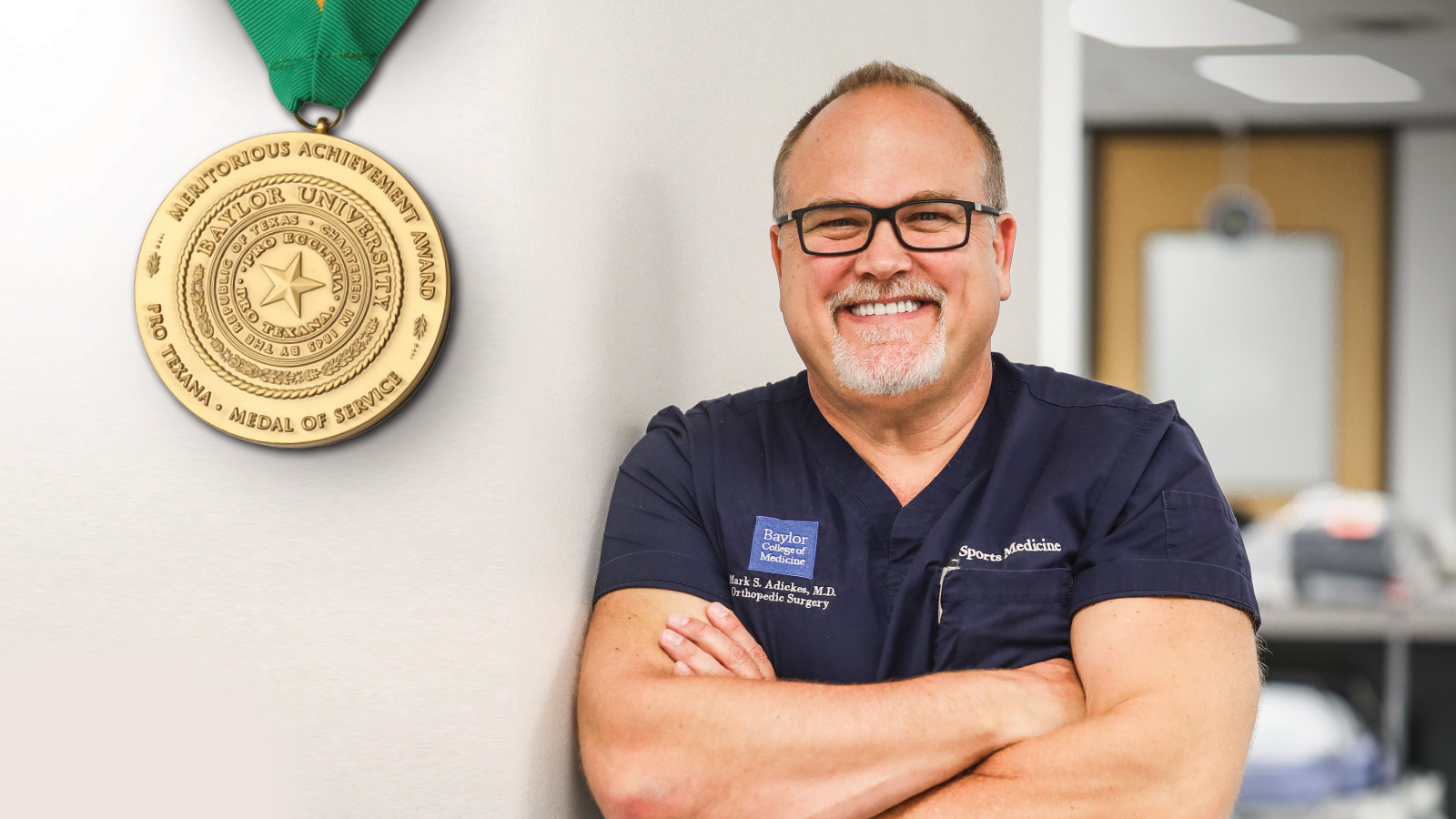Mark Adickes, MD
Medal of Service for Contributions to the Professions, Medicine: Awarded to individuals for dedication to advancing their chosen fields and making significant impacts in our world

More than 30 years after his last snap as a standout offensive lineman for the Baylor Bears, Mark Adickes still wears his Baylor uniform; however, he has traded shoulder pads for scrubs—making the leap from athlete to physician and treating patients for injuries similar to those he experienced as a college and professional football player.
Adickes played for Grant Teaff’s Bears of the early 1980s and followed that with a six-year National Football League (NFL) career before he embarked on a 13-year journey to become an orthopedic surgeon.
In 2016, he was named chief of the division of sports medicine and professor of orthopedic surgery at Baylor College of Medicine in Houston, a move that allows him to proudly wear Baylor on his chest once again.
“When Baylor College of Medicine was looking to expand their sports medicine department, they gave me the opportunity come along and lead,” Adickes, BBA ’84, says. “It’s the premier college of medicine in Texas and there are so many ways here to teach and serve. Of course, the chance to say I’m with Baylor again was certainly part of the allure.”
The Baylor College of Medicine appointment is another step in a journey that he did not envision during his days as a student in Waco.
Adickes earned a management degree during a successful stretch for Baylor on the football field. He received All-America honors in 1983 and went on to play for the NFL’s Kansas City Chiefs and Washington Redskins. He won a Super Bowl ring with Washington and served as a team captain before injuries forced his retirement following the 1992 season.
“I got to the end of my football career and started thinking about what I was going to do with the rest of my life,” Adickes says. “I had a good playing career, but I didn’t have enough money to sit on the couch, nor do I think that’s what God intends us to do. I looked at a number of different fields, including physical therapy school and med school, and spent a lot of time in prayer.”
The answer to his prayers was the discovery of a new calling—becoming a doctor.
Adickes, who underwent 13 surgeries during his football career, had experience in waiting rooms and on operating tables.
What he didn’t have—a pre-med background or noteworthy grades in college—might have been enough to keep most people from pursuing a medical career. After all, his business classes didn’t count toward a medical degree.
“I know the kind of people that go to Baylor and serve Baylor, and it's a tremendous honor to be honored.”
Adickes started from scratch, taking undergraduate classes all over again. He earned a second undergraduate degree, finishing in three years at George Mason University. After receiving his medical degree from Harvard medical school, Adickes completed his residency training in orthopedic surgery at the Mayo Clinic and his sports medicine fellowship at the Steadman-
Hawkins Clinic in Vail, Colorado.
The journey of a second trip through college, medical school and a residency took 13 years.
Adickes then found a new home in Houston, where he held sports medicine positions with Memorial Hermann Health System and the University of Texas Health Science Center. He made a name for himself treating patients for knee, shoulder and hip problems. Patients found Adickes to be a doctor who could put himself in their shoes because he’d been on their side of the table many times.
“My career as a football player really helps me now. When I talk to patients about therapy, I know what it means and what it takes to succeed because I’ve had to do that. I’ve done the exercises,” Adickes says. “I know what hip pain feels like, what shoulder pain feels like. I’ve gone through it and can communicate that. There’s trust there.”
Adickes serves a variety of patients, from high school students to college and professional athletes. In 2009, he surgically repaired Baylor quarterback Robert Griffin III’s torn anterior cruciate ligament (ACL), paving the way for Griffin’s Heisman campaign two years later. Beyond the Baylor connection, there’s a certain symmetry in an offensive lineman helping out a quarterback.
“As a lineman, what we’re really trying to do is allow the success of the skill players,” Adickes says. “You’re protecting them, you’re clearing a path. And as a doctor, that’s what we’re doing, too. We’re trying to allow our patients to be successful and do what they want to do in life. So, there really are parallels, and I think being an offensive lineman, with that mindset, served me well.”
When Adickes is not working with patients, he maintains a busy schedule. He and his wife Jacqueline are the parents of five children. He works seven days a week in the fall, serving as a sports injury expert on ESPN and DirecTV. Adickes provides explanations of injuries as part of gameday coverage and via his Twitter account, @jocktodoc.
He also maintains a close relationship with his alma mater. In 1996, Adickes was named to the Baylor Athletic Hall of Fame, and he remains in close contact with numerous former teammates and Baylor friends.